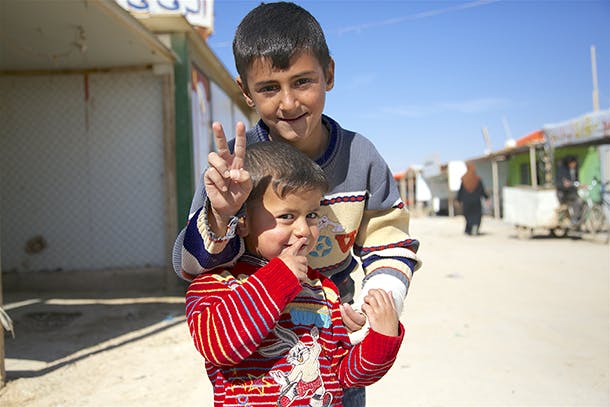
Parents around the world want their children to be able to go to school and follow their dreams. Yet for millions of children forced to flee their homes because of conflict and violence, education is often out of reach.
Each of us can support United Nations efforts to help refugee children learn. Here are five reasons why you should care.
- Every child has the right to education. As the UN Children’s Fund (UNICEF) states, “Education is a fundamental human right: Every girl and boy in every country is entitled to it.”
- Refugee children are five times more likely to be out of school than non-refugee children. According to the UN Refugee Agency (UNHCR), only 50% of refugee children have access to primary school worldwide, only 22% of refugee adolescents have access to lower secondary education, and only 1% of refugees attend university. Forced to flee their homes, refugee children often don’t have a school to go to. If there are schools nearby, they are often overcrowded and refugee children may not speak the language that is taught.
- On average, less than 2% of humanitarian aid goes toward education. Despite the enormity of the challenge, education for displaced children is severely underfunded. At the World Humanitarian Summit in May, UN agencies and partners launched “Education Cannot Wait,” a new fund to support education for children in emergencies and protracted crises.
- Classrooms provide a safe space for children. In addition to providing children with skills, classrooms help connect refugee children to social services and provide a sense of normalcy and a safe space for children who have often faced trauma. UNHCR says, “Besides academic subjects, they can learn about basic health care and hygiene, citizenship, human rights, and where, how, and from whom to get help.”
- Education is key to brighter futures for refugee children – and for all of us. Education is vital to children: It helps them learn skills, build confidence, and think critically. It also improves their chances at earning an income as adults and moving out of poverty. This is good for children and for society. As UNHCR notes, failing to education children can help perpetuate conflict and “means lost opportunities for peaceful and sustainable development in our world.”
In 2015, world leaders gathered at the UN and adopted the Sustainable Development Goals, which include a goal to ensure quality education for all children by 2030. To keep this promise, we must do more as a global community to support education for refugees and for children in crisis situations.
UNHCR High Commissioner for Refugees Filippo Grandi has noted our obligation, saying: “Refugees face two journeys, one leading to hope, the other to despair. It is up to us to help them along the right path.”
To support UN efforts to help more refugee children go to school, you can donate to UNHCR here and share on social media that you stand #WithRefugees. To learn more, read UNHCR’s report, “Missing Out: Refugee education in crisis.”
You can also join the UN Foundation’s Girl Up campaign in supporting education for refugee girls in Uganda by donating here.



 View All Blog Posts
View All Blog Posts